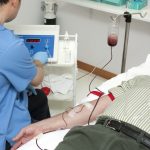by: Sara Middleton
(NaturalHealth365) Greater than 3,000: that’s how many new cases of acute lymphoblastic leukemia (ALL) are diagnosed every year in the United States. According to the Centers for Disease Control and Prevention, ALL is responsible for 20% of all cancers in people younger than 20 years old. And, sadly, the Dana-Farber Cancer Institute finds that up to 1 in 5 kids who undergo chemotherapy for ALL will relapse – even if they initially receive a complete remission of the cancer.
Now, new research reveals a frightening correlation: the chemotherapy itself may be responsible for many of these cancer relapses!
Breaking cancer news: Chemotherapy responsible for 20% of leukemia relapse cases
ALL is a type of cancer that develops when a person’s bone marrow begins to overproduce white blood cells called lymphocytes. The disease tends to progress quickly, causing the new lymphocytes to be immature. When the immature lymphocytes begin to outnumber the mature white blood cells, it becomes difficult for a person to fend off infections.
ALL is the most common childhood cancer. While outcomes are generally favorable, anywhere from 15 to 20% of children experience relapse of their leukemia, and the disease can be fatal.
A new paper published in the journal Blood suggests a disturbing explanation for some of these cases of relapse – what the authors call “chemotherapy-induced drug resistance mutations.”
The researchers performed genome-sequencing in 103 young ALL patients with a history of cancer relapse. They discovered mutational “signatures” in about 20% of these patients that were consistent with chemotherapy drug resistance.
Based on their findings, the authors suggest that chemotherapy can induce certain genetic mutations and “facilitate a subset of pediatric ALL relapses.” They also suggest that less toxic therapies and more individualized approaches to cancer management should be undertaken.
Considering that the vast majority of people who die of ALL will experience a relapse first, the importance of this cannot be understated. Unfortunately, this isn’t the only reason medical professionals are concerned about powerful chemotherapy drugs.
At least two other notable health risks are associated with chemotherapy beyond drug-induced relapse, research finds
Chemotherapy drugs are cytotoxic chemicals and are considered the main type of treatment for ALL and other cancers. These include powerful man-made drugs like cytarabine, doxorubicin, asparaginase, and methotrexate. These may be administered for up to two years or longer and can exact widespread effects on the body.
As an example, it’s well-known that chemotherapy often leads to debilitating side effects including nausea, an increased risk for infections, neuropathy, gastrointestinal distress, and trouble breathing. But as we’ve already reported here before, chemotherapy may also lead to other serious health problems, including:
- Brain damage and memory loss
- Accelerated aging and an increased risk of premature death
Are cancer patients – or, in the case of ALL and other types of pediatric leukemia, the patients’ caregivers – being informed about these dangerous and potentially deadly effects of chemotherapy? Could we save the lives of hundreds of American children every year simply by exploring other cancer treatment options beyond the knee-jerk reaction to stick everyone on chemotherapy?
Based on the research, we think it’s possible – and we think it’s a conversation more medical professionals need to have.
Sources for this article include:

No hay comentarios:
Publicar un comentario